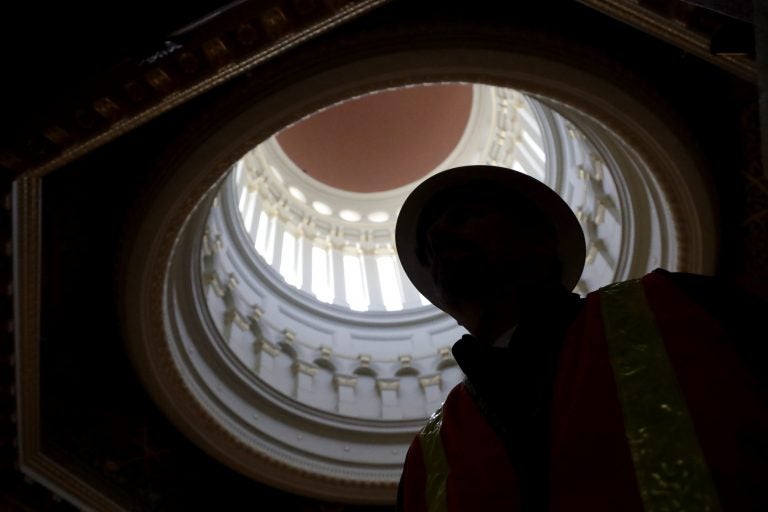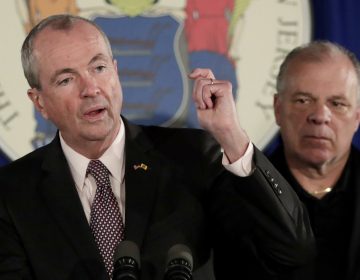Dark-money bill advances, sans requirement for retroactive reporting
Is New Jersey actually close to legislation that would require all groups that engage in electioneering and lobbying disclose major donors?

Inside the New Jersey State House building in Trenton. (Julio Cortez/AP Photo)
This story originally appeared on NJ Spotlight.
—
The requirement to disclose significant contributions and spending by politically active nonprofits — known as “dark money” — is moving ahead in the Legislature, despite the elimination of what seemed to be one of the bill’s goals — to embarrass Gov. Phil Murphy after a group that supports Murphy went back on its word to reveal its donors.
Nonprofit organizations known as 501(c)(4)s engage in electioneering and lobbying, but are not currently covered by state contribution-reporting requirements. Legislation that would require them to reveal contributions of at least $10,000 and expenditures of $3,000 or more had languished in Trenton for years until it got a push from Senate President Steve Sweeney (D-Gloucester), provided that it be made retroactive to the beginning of last year. That would have required the Murphy-centric group to reveal its donors from 2018.
That retroactive disclosure was not included in the Assembly version of the bill, A-1524 approved Monday by the Assembly Appropriations Committee.
Still keeping secrets?
That did not affect the views of a wide array nonprofits that do not consider themselves “bad actors” and oppose the legislation.
Assemblyman Andrew Zwicker (D-Middlesex), a prime sponsor of the Assembly version of the bill, disagreed with critics. He said the measure is not “too broad” and is not trying to “punish” any groups.
“In my opinion, it is not up to us to decide who the ‘good actors’ are, but to require disclosure by all,” said Zwicker, calling the measure “a clean bill, a strong bill.”
His bill passed the committee without the provision in the Senate version of the bill, S-1500, sponsored by Sen. Troy Singleton (D-Burlington), that would require the disclosure of donors retroactive to January 1, 2018. That language in the Senate bill had caused the most concern for Zwicker because it could be considered unfair to change the rules after people had given money to groups last year in expectation their contributions would remain private.
But it was the retroactive-reporting requirement that had given the bill momentum in the Senate.
After receiving little legislative interest in the first 2 1/2 years it was pending, the measure moved through the Senate with relative speed after Sweeney championed it. Although he is not one of the bill’s sponsors, Sweeney announced his support after an organization with ties to Murphy reversed course earlier this year and said it would not voluntarily disclose its donors. Sweeney and Murphy have been feuding over a number of issues since the governor took office.
Sweeney backs Senate bill
Following Sweeney’s announced support, the Senate bill was amended to make disclosure retroactive to the start of last year. That would ensure that New Direction New Jersey, a 501(c)(4) group that has backed Murphy’s agenda with ads — and for which the governor has raised money — would have to disclose its funders. Sweeney was annoyed by New Direction’s first ad, which ran last June during negotiations over the state budget. A second ad supporting a $15 minimum wage ran more recently. Murphy has since signed the higher wage into law.
The timing of the retroactive-disclosure provision was controversial for another reason: It would not have covered any activities that may have been undertaken by the General Growth Fund to assist the re-election of Sweeney in 2017, when the New Jersey Education Association spent millions trying to unseat him and his race was the most expensive in the state. The fund is a 501(c)(4) with ties to Sweeney and South Jersey political boss George Norcross, as well as the General Majority PAC, which does have to disclose its contributors.
For years, the New Jersey Election Law Enforcement Commission — the state’s campaign-watchdog — and good-government activists have been calling in vain for rules to make dark-money organizations report who funds them. At the national level, such well-known groups include the conservative Americans for Prosperity and the liberal Majority Forward and are considered dark-money groups, although they would not be covered by the state law unless they operate within New Jersey.
Over the past decade, these groups have increased their election-related spending exponentially. In 2017, they spent nearly $50 million to influence gubernatorial and legislative races.
Who’s paying?
The main problem with dark money is that voters do not know who is paying for ads meant to influence their votes. That makes it more difficult to evaluate those ads when deciding which candidates and public questions to support. Dark money’s influence over campaigns has also been a problem at the national level, particularly in the wake of two U.S. Supreme Court decisions this century. This legislation would affect only groups active in state elections.
“We think it’s very, very important for these dark-money groups to disclose their activities,” said Jeffrey Brindle, ELEC’s executive director.
Zwicker’s bill would require 501(c)(4), 501(c)(6), and 527 groups that spend at least $3,000 a year to influence an election or to support or oppose legislation or regulations to file reports with ELEC. As part of that reporting, all those who contribute at least $10,000 to a given organization would have to be identified.
Although many citizen groups support this effort, the broad focus of the legislation has drawn the ire of a number of other nonprofits of all political bents that do not necessarily work for or against a candidate — the traditional definition of dark money — but that do lobby on issues. They fear the measure will lead to a loss of funds, since some donors don’t want to be identified and it will infringe on their First Amendment right to free speech. Several representatives of 501(c)(4)s testified that such disclosure would have a “chilling effect” on their individual efforts.
“Having to share who donors are, actually ends up harming organizations that do controversial work,” said Amol Sinha, executive director of the ACLU-NJ, whose work includes defending the civil rights of those accused of crimes, against police brutality and overreach, and safeguarding individuals’ rights to practice their chosen religion or to follow no religion.
Doug O’Malley, director of Environment New Jersey, called for legislators to make a distinction between true dark-money groups whose primary mission is to support or defeat candidates or ballot questions and groups such as his that are grassroots organizations made up primarily of citizens that advocate for or against issues. He said California law “includes language designed specifically to protect organizations like ours.”
Facing a court challenge?
John Tomicki, a longtime conservative lobbyist who is the executive director of the League of American Families, called the bill “unconstitutional” and warned that if it is enacted “you will find it challenged in court.”
Sinha cited legal precedence that he said would prevent New Jersey from requiring groups like the ACLU to disclose their donors and dues payers, noting that a 1958 Supreme Court decision prevented Alabama from requiring the NAACP to provide the state with its list of members.
But representatives of other groups said the $10,000 threshold for disclosing donors was high enough not capture most contributors, and Brindle said it is likely that contributors would find ways to get around the $10,000 threshold.
Sandra Matsen of the League of Women Voters of New Jersey said the nonprofit has its own concerns with some of the bill’s requirements, including that the reporting rules could be “burdensome.” Still, the league is backing the measure.
“In total, we think the good weighs more than the concerns,” she said.
“Groups that are trying to influence the outcome of any election or legislation should not be permitted to operate under a veil of secrecy,” said Assemblywoman Shavonda Sumter (D-Passaic), a bill sponsor. “Disclosing donors and expenditures is not a novel idea. It’s something we do as candidates. We’re just requiring the same of advocacy organizations.”
The full Assembly could vote on the bill as early as next Monday. Because it is not identical to the Senate bill, it will still need approval by the Senate, or the two houses will have to work on some sort of compromise before it reaches Murphy’s desk. The governor has said he supports disclosure but does not comment on specific bills so it is unclear whether he would sign either version in their current forms.
WHYY is your source for fact-based, in-depth journalism and information. As a nonprofit organization, we rely on financial support from readers like you. Please give today.




